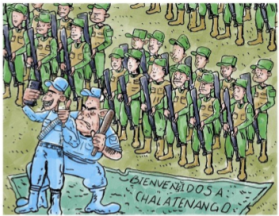Statement by Stop CAFTA Coalition for House Ways and Means Hearing on Trade and Globalization
January 30, 2007
The Honorable Chairman Charles B. Rangel
2354 Rayburn HouseOffice Building
Washington, DC 20515
RE: STATEMENT BY STOP CAFTACOALITION FOR HOUSE WAYS AND MEANS COMMITTEEHEARING ON TRADE AND GLOBALIZATION
Dear Chairman Rangel,
In conjunction with the House Ways and Means Committee Hearing onTrade and Globalization, the Stop CAFTA Coalition would kindly like to submitthis written statement for consideration by the Committee and for inclusion inthe printed record of the Hearing.
While it is important to acknowledge that trade andglobalization have presented opportunities and challenges to several industriesand sectors throughout the United States, we would also like the Committee tofocus on the devastating effects of U.S. trade policies on developing countriesand their impoverished citizens. Inparticular, we ask that the Committee keep in mind the preliminary results andeffects of the Dominican Republic and Central American Free Trade Agreement(DR-CAFTA) on our Central American neighbors in lieu of determining the fate ofthe Peru, Colombia and other proposed trade agreements.
In September 2006, the Stop CAFTA Coalition, incoordination with friends, allies, and counterparts in CentralAmerica, issued the Monitoring Report: DR-CAFTA in Year One(which can be downloaded in English and Spanish at www.stopcafta.org), looking primarily atthe process of implementing DR-CAFTA since January 1, 2006. While it is far too early to detail long-termtrends in labor, textiles, agricultural practice and policy, investmentpatterns, services, and environmental consequences of DR-CAFTA, some earlytrends have emerged demonstrating how the benefits of DR-CAFTA are not beingbroadly spread to working people, farmers, local businesses, and consumers inCentral America, despite promises to the contrary.
BACKGROUND
As the Committee is aware, the US- Central America FreeTrade Agreement (CAFTA) was initiated by the Bush administration in January of2002 as an effort to revitalize faltering talks for a Free Trade Area of the Americas.After a year of preliminary discussions, "negotiations" began in February of2003 and were completed in December of that year between the United States, ElSalvador, Guatemala,Nicaragua, and Honduras. Costa Rica joined the accord inJanuary of 2004, and all six countries formerly signed in May of 2004. In August of 2004 the Dominican Republic was docked tothe core agreement creating the U.S.-Dominican Republic-Central America FreeTrade Agreement (DR-CAFTA).
DR-CAFTA was adopted first by ElSalvador in December of 2004; Hondurasand Guatemala in March of2005; the United States inJuly of 2005; and Nicaraguaand the Dominican Republicin September of 2005.
DR-CAFTA was initially intended for implementation on January 1, 2006. Shortlybefore, in mid-December 2005, the United States Trade Representative (USTR)announced that in its estimation, countries in CentralAmerica had failed to fully enact laws necessary to bring theirlegal systems into compliance with changes mandated by DR-CAFTA. At this pointthe USTR set in motion a process of rolling implementation, whereby, the USTRwould certify countries as ready to implement CAFTA on a case-by-case basis. Asa result of this policy DR-CAFTA was implemented first by the United States and ElSalvador on March 1, 2006; Nicaraguaand Honduras on April 1, 2006; and Guatemalaon June 1, 2006.
The USTR has yet to allow the implementation of theagreement in the DominicanRepublic. Costa Ricaremains the only country to have not ratified the agreement.
FINDINGS OF "DR-CAFTA IN YEAR ONE" MONITORING REPORT
The process of rolling implementation has had negativeconsequences for the region and for the United States particularly bycreating confusion surrounding the governing rules of origin for textiles. Theresult has been lost jobs in the United Statesand parts of Central America. Far fromcreating the promised regional textile complex to offset competition from China, the ham-handed approach to implementingDR-CAFTA has contributed to a trend, already in place, of Central Americalosing market share to competitors from Asia.
The confusion surrounding implementation has been by andlarge the creation of the United States Trade Representative and Congressionalleadership. The USTR has insisted on new concessions from Central Americancounterparts that go beyond items negotiated during CAFTA discussions. Theseconcessions include:

 "I am a CISPES supporter because continuing to fight for social justice and a more people-centered country means continuing the dream and sacrifice of thousands of my fellow Salvadorans who died for that vision.” - Padre Carlos, New York City
"I am a CISPES supporter because continuing to fight for social justice and a more people-centered country means continuing the dream and sacrifice of thousands of my fellow Salvadorans who died for that vision.” - Padre Carlos, New York City

